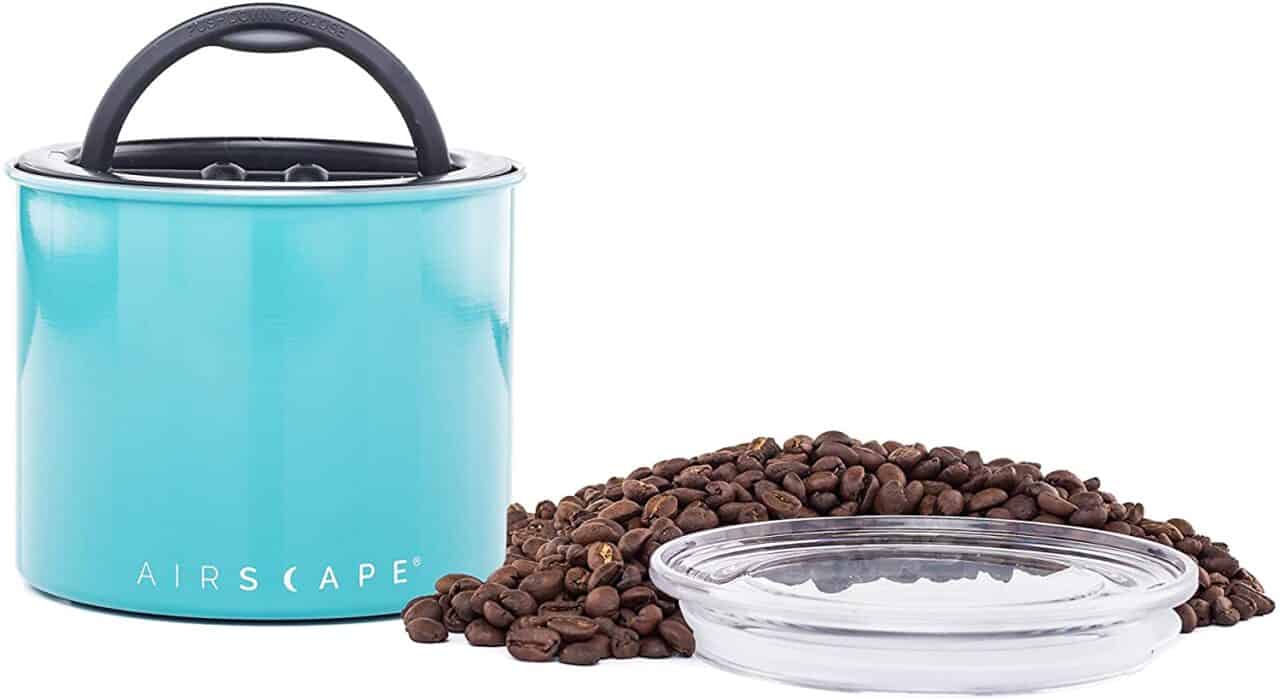When it comes to storing coffee, many people simply keep the beans in the bag they came in and don’t give it a second thought. However, you may want to rethink how you store your beans – as it could drastically be affecting the shelf life and flavor of your cup of joe.
From storing beans whole or ground to keeping them in the pantry or the freezer, the way you store your coffee could make or break the taste of your morning drink.
Here are some of the best tips we’ve found for storing your coffee!
Why You Should Store Coffee Properly
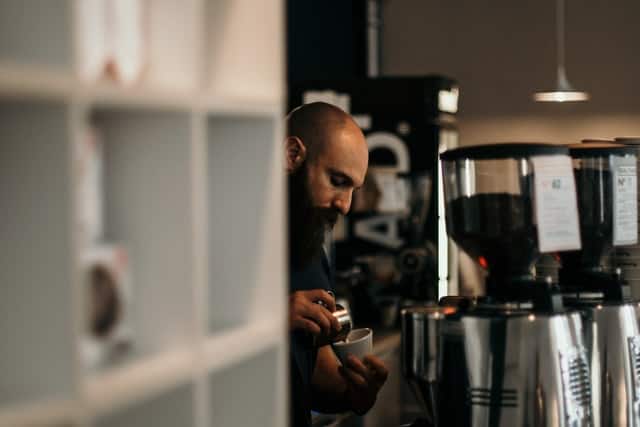
Coffee can be temperamental and be affected by everything from humidity to sunlight – but storing your beans is not as complex as it may seem.
A lot of it comes down to physics and chemistry. When beans are ground and water filters through, the water extracts the flavor. Going through larger grounds, the water will absorb less flavor.
It will pick up more when going through smaller grounds, Dr. David Hoxley from La Trobe University’s Department of Chemistry and Physics said (latrobe).
Just as iron rusts over time, coffee can oxidize and go stale once exposed to air. We go deep into oxidation in our article, Coffee Oxidation, A Scientific Look.
This happens when the oils in the beans meet the air and start creating other flavors – that are not ideal. This can cause your cup of coffee to taste funky as the chemical reaction occurs, leaving it tasting stale or bitter.
As soon as the beans are roasted, the clock starts ticking – and over time, the flavor of your cup of coffee will begin to go stale. To minimize this effect, you can optimize the lifetime of your coffee and keep the flavors as bold and rich for as long as possible by storing them smartly.
Ultimately, keeping the beans or grounds exposed to as little air as possible to prevent oxidizing and stashing them in a cool, dry place will help you get the most life out of your coffee.
Make sure to check out our article, Can Coffee Go Bad? We’ve Got The Answer! Where we look into coffee aging more.
How Long Can You Store Coffee For?
Coffee is going to taste the best the fresher it is. But how long do you have to use the grounds once you bring the beans home from the roaster? Experts say beans are best used within one to two weeks.
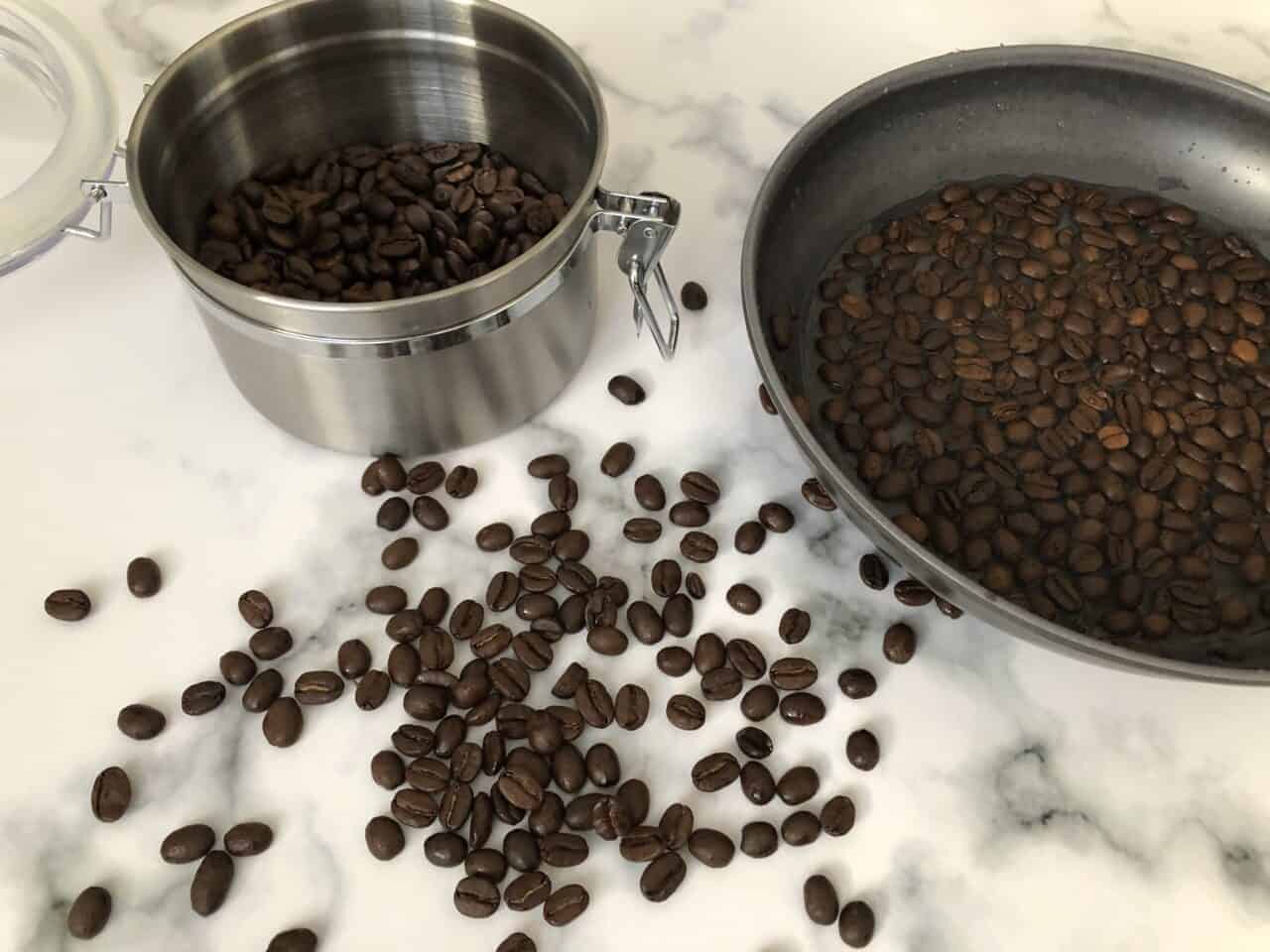
Over time as the roasted beans are exposed to air, the flavor profile can begin to change.
Try buying smaller batches if you’re not going through your coffee within this window – or if you’re up for it, try adding another delicious cup to your daily routine.
Just because the flavor is freshest after one to two weeks doesn’t mean it’s not drinkable after that timespan, however. Beans can be kept for a month or two and still be used to make coffee – but you’re going to get a better-tasting cup the closer they’re used to the roasting date.
You can safely still use beans for a couple of months after you get them from the roaster, and by storing them properly, make sure you keep them tasting as fresh as possible.
If you’re wondering how long coffee keeps its smell, take a look at our article here, This Is How Long Coffee Beans Keeps Their Smell.
How Do You Store Coffee Long-Term?

Like many other food items, air, moisture, and light are the three things that can shorten your coffee’s lifespan. Ideally, beans should be kept in an airtight container, away from any humidity and in a cool (room-temperature) space.
Using an opaque container will ensure things like sunlight won’t affect the lifespan of your beans. As opposed to the bag the beans came in, an airtight container will also help keep any extra moisture away from the beans.
This may not be a concern for those who live in moderate climates. For those who live in areas with lots of moisture year-round – like Florida – this can be a game-changer.
Keeping your coffee in the cabinet or the pantry versus on the counter. This can also help ensure that it’ll be kept away from things like moisture and light. If you’re keeping them in a cabinet, be sure it’s not next to somewhere that gets hot – like an air vent or the oven.
This will ensure the beans are kept in the mildest conditions to maximize shelf life.
Although it may be tempting to buy in bulk, it’s best to buy only as many beans as you’ll go through in two weeks to two months – to ensure you’re getting the best flavor in each cup of coffee.
Should You Store Coffee Beans Ground Or Whole?
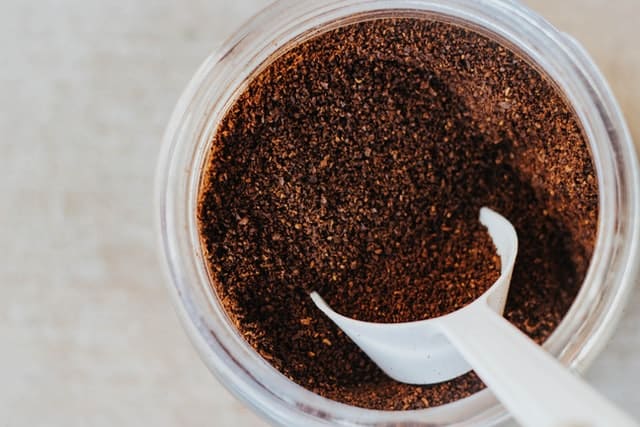
Getting pre-ground coffee beans can be a major convenience factor for those that don’t have a grinder themselves. Or, maybe you pre-grind your coffee beans to help save time on busy mornings as you’re rushing out the door to work.
However, storing ground coffee further shortens the beans’ lifespan – and can cause them to go stale faster.
Grinding coffee and keeping it stored exposes the beans to more air – meaning that the oxidizing process is fast-tracked, causing it to lose its flavor profile as the oils combine with air.
Ideally, beans should be stored whole to minimize the amount of the bean that’s exposed to the air and ground as they’re used. You don’t need an expensive coffee grinder – and it can be a great investment that will help put a little pep in your step in the mornings as your coffee tastes that much better with freshly ground beans.
If you do not have time to grind your beans right before brewing, try pre-grinding a day or two at a time – or even better, just grinding enough for the next morning the night before.
This ensures you’re exposing the least amount of grounds to as little air as possible, giving you the best-tasting coffee each time you brew it.
Will Sunlight Affect Coffee?
Short answer: yes, sunlight can affect your coffee.

Just as UV rays can damage your skin and cause aging faster, they can also affect food and other items – like coffee. This will cause beans, and other food to go stale and oxidize more quickly.
Keep your beans shielded from the sunlight – and other lights in your home.
Opaque containers or keeping them out of light and in the pantry or a cabinet will ensure the sun doesn’t cause the beans to spoil faster. The more you keep the beans in the dark and protected from external light, the fresher and more rich your cup of coffee will taste.
How to Store Whole Coffee Beans
When it comes to lengthening the life of your coffee, storing beans whole is your best bet. It’s best to keep them whole for as long as possible. If you can, grind them right before brewing a cup of coffee.
Take the beans out of the bag they came in – as this will allow you to control more factors and store them in a better space to maximize their lifetime and freshness.
Keeping the beans away from heat, light, moisture and in an airtight, opaque container will ensure they’re kept in the best conditions to brew a bold, flavorful cup and keep the grounds from tasting stale.
How to Store Ground Coffee Beans
Ground coffee should be stored, in short, for as little time as possible. If you must, keep them as you would all other beans – in a cool, dry place and in an airtight container that won’t let any light pass through.
If you buy pre-ground beans, make sure to transfer them out of the roaster’s bag and into a container that keeps them protected from light, moisture, and air.
Grinding beans the night before you brew your morning cup? After you grind them separate from your whole beans, and keep them in their own airtight container that blocks out light, and make sure to keep them away from excess moisture or heat.
This will ensure your grounds taste as fresh as possible – even if you have to grind them hours before brewing to save on time in the busy mornings.
Where Is the Best Place to Store Coffee Beans at Home?
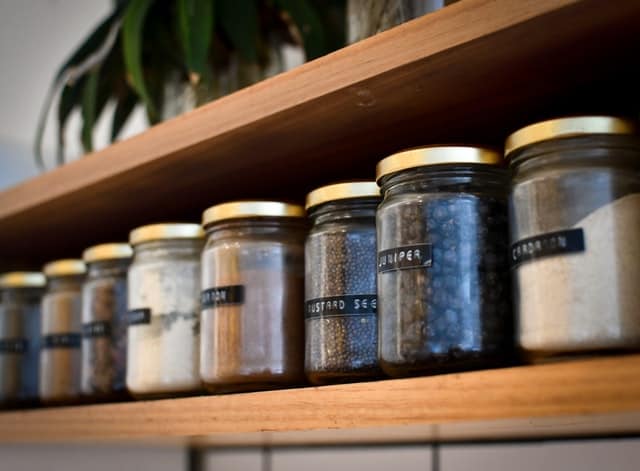
Coffee beans are best kept in a temperate space.
Most likely, you’ll be brewing your coffee in the kitchen – so it makes the most sense to store them there. But there are a few things to consider. Should you keep them on the counter, next to the coffee machine, or tucked away in the pantry?
It depends on a few different things. If your kitchen gets a lot of natural light, even if you’re storing them in an opaque container, it may be a good idea to keep them in a cabinet or the pantry. This will ensure the sunlight doesn’t alter the beans.
If you’re keeping your coffee beans tucked away in the cabinet, be sure it’s not somewhere that will affect the beans’ temperature – like directly next to the refrigerator or beside the oven. Room temperature is best.
That being said, this opens us up to a common question about freezing your coffee.
Does Freezing Coffee Make It Last Longer?
Baristas and coffee experts are divided on whether freezing your beans is a life-saver to extend the lifespan or whether it’s a sin that the coffee gods would gawk at.
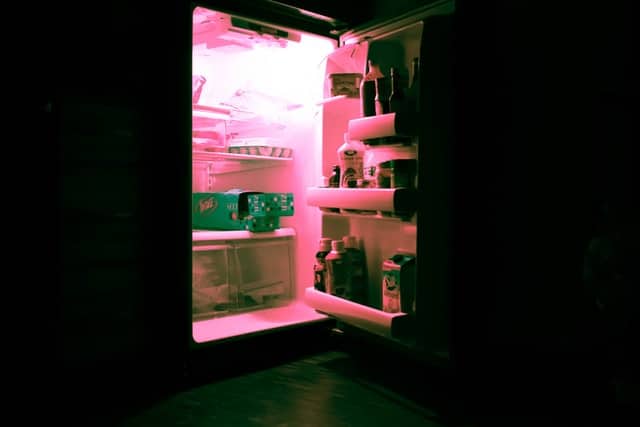
Just as coffee oxidizes when it’s exposed to air, the grounds tend to be largely affected – and absorb – the flavors around it. Have you ever kept ice cream in the freezer only to find it has that slightly stale, freezer-burnt taste?
It will be worse with coffee beans. The air pumped through the freezer and the other items kept in close proximity to the beans can all be absorbed by your coffee.
Ideally, beans would not be kept in the freezer.
This helps keep your beans from absorbing all the different flavors from the foods nearby and the cold air and ice in the freezer. Instead, try to find another cool, dry place where you can safely stash your beans.
If you must buy in bulk, it’s probably a safer bet to stash them in your pantry in an airtight container that blocks out all light.
What Are The Best Containers For Storing Coffee?
While it may be tempting when moving your beans from the roaster’s bag to a beautiful glass container, it may not be the best idea.
While it may be aesthetically pleasing, glass containers allow light through, which we’ve discussed, isn’t the best for keeping the beans fresh for longer periods. Sunlight can cause beans to go stale faster, and other light can speed up this process. Opt instead for an opaque container that won’t let light through.
You’ll also want something with an airtight seal to keep air from flowing in and out, to keep out excess moisture.
Something with a tight seal – whether it’s a screw-on or suctioned lid on a jar – will ensure you can keep the beans as safe from the outside environment as possible. The less air your beans come in contact with, the better.
Try to get one that is just big enough for the amount of beans you’ll be buying, so there’s not leftover unnecessary space. You can also try having multiple small jars to store your coffee so that way not all of your beans are exposed to as much air at once as you go through the batch.
The key things to remember when shopping for the perfect container: don’t let light, air, or moisture get to the beans.
Check out my article, where I go into detail about the best options for storing coffee.
How Much Coffee Can You Store At Once?
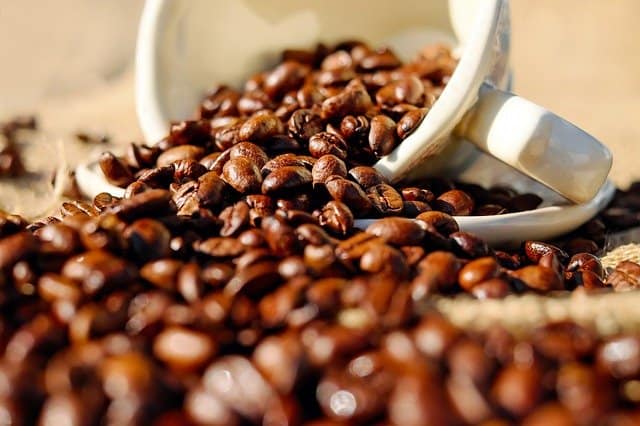
Ideally, you’ll only be buying as much coffee as you can use at once. With the optimal shelf life being one to two weeks, consider buying just a bag of beans. Or as much as you’ll go through in that period, at a time.
However, you can use beans for a month or two, and they should still make a delicious cup of coffee.
Buying in bulk can be tempting as it is often a money-saver but it may mean your beans sit on the shelf for six months to a year before they get used. It’s ideal to buy in smaller batches and purchase your beans more frequently, as you’ll be getting fresher coffee from the roaster each time.
Think of it like buying produce. While it may be cheaper to buy a whole bag of apples, if you don’t eat the entire bag at once, it might go to waste.
So it’s better to buy one or two that you’ll eat for the week instead. This is the same with coffee.
You could stash a couple of bags moved into airtight, opaque containers in your pantry if you’ll go through them within a couple of months. However, if you can manage it, try only to get a week or two worth of beans at the time.
You’ll thank yourself as you make that first pot coffee in the morning and have a full, rich flavored cup – rather than one that falls flat and tastes stale due to using old beans.
Don’t Throw Out Stale Coffee Beans
If you’ve had old coffee beans in your freezer or pantry for who knows how long, you can still put them to good use.
Making iced coffee or cold brew is a great way of cutting down waste. Cold brew coffee is not particularly dependent on fresh ground coffee beans. By the very nature of brewing with cool water the extraction process of the beans won’t pull the stale flavors out of the grounds.
We have a great article on How to Make Iced Coffee at Home if you’re up to the challenge!

